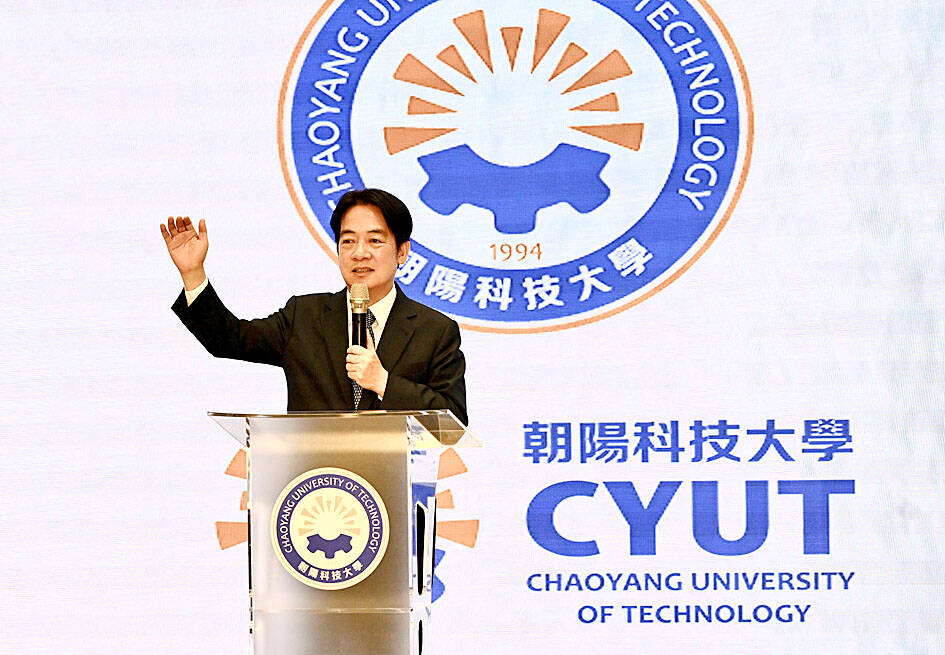The government is to subsidize students at private universities “at least half” of the gap between the tuition fees of public and private universities, which is estimated to be about NT$25,000 (US$809) per year, Vice President William Lai (賴清德) said yesterday.
Lai made the remarks when attending a flag-awarding ceremony at Chaoyang University of Technology’s summer volunteers camp in Taichung.
The average tuition fee at public universities is about NT$62,000 per year, while that of private universities is about NT$110,000 per year, which is a gap of about NT$50,000 per year, Ministry of Education Department of Higher Education Director-General Chu Chun-chang (朱俊彰) said.

Photo: Liao Yao-tung, Taipei Times
Although most economically disadvantaged students can receive financial aid for tuition fees, many still need to depend on student loans or part-time jobs to pay for daily expenses, which could affect their education, Chu said, adding that even if they study at public universities, some might still have a financial burden from their daily expenses.
The ministry would subsidize students at private universities by directly deducting the money from the total tuition fee when they pay for it at the beginning of each semester, substantially reducing their financial burden, he said.
The subsidies are to be implemented from the second semester of the 2023-2024 academic year, and approximately 473,000 students at private universities are expected to benefit from it, he added.
Adding existing tuition and miscellaneous fee exemptions and scholarships provided by various government agencies, a total of about 591,000 students at private universities would be eligible for a minimum of NT$25,000 deducted from their tuition and miscellaneous fees, Chu said.
Deputy Minister of Education Lio Mon-chi (劉孟奇) said the subsidy plan is an education policy, not an election campaign promise, and that it is expected to cost about NT$15 billion per year.
Executive Yuan spokesman Lin Tze-luen (林子倫) said the Cabinet supports and approved the policy of closing the gap between the tuition fees of public and private universities.
The Taiwan Youth Association for Democracy yesterday said the gap between tuition fees has often been discussed by students, so the association also agrees with the idea of a subsidy, as it would help ease the financial burden on university students.
The Union of Private School Educators yesterday also issued a statement to express its approval of the policy.
Union president Yu Jung-hui (尤榮輝) said the policy would serve as a morale booster to critically endangered private universities, and although it would not necessarily prevent them from being shut down, it would improve the universities’ competitiveness in recruiting new students and also provide fairer education opportunities for students from economically disadvantaged families.
However, the union said it hopes the policy is only the beginning of reforms, as there are many regulations that need to be amended.
The government should implement a forward-looking blueprint for the future of higher education at private schools, allowing them to become top universities, it said.
Additional reporting by Chen Chien-chih

A car bomb killed a senior Russian general in southern Moscow yesterday morning, the latest high-profile army figure to be blown up in a blast that came just hours after Russian and Ukrainian delegates held separate talks in Miami on a plan to end the war. Kyiv has not commented on the incident, but Russian investigators said they were probing whether the blast was “linked” to “Ukrainian special forces.” The attack was similar to other assassinations of generals and pro-war figures that have either been claimed, or are widely believed to have been orchestrated, by Ukraine. Russian Lieutenant General Fanil Sarvarov, 56, head

SAFETY FIRST: Double the number of police were deployed at the Taipei Marathon, while other cities released plans to bolster public event safety Authorities across Taiwan have stepped up security measures ahead of Christmas and New Year events, following a knife and smoke bomb attack in Taipei on Friday that left four people dead and 11 injured. In a bid to prevent potential copycat incidents, police deployments have been expanded for large gatherings, transport hubs, and other crowded public spaces, according to official statements from police and city authorities. Taipei Mayor Chiang Wan-an (蔣萬安) said the city has “comprehensively raised security readiness” in crowded areas, increased police deployments with armed officers, and intensified patrols during weekends and nighttime hours. For large-scale events, security checkpoints and explosives

‘POLITICAL GAME’: DPP lawmakers said the motion would not meet the legislative threshold needed, and accused the KMT and the TPP of trivializing the Constitution The Legislative Yuan yesterday approved a motion to initiate impeachment proceedings against President William Lai (賴清德), saying he had undermined Taiwan’s constitutional order and democracy. The motion was approved 61-50 by lawmakers from the main opposition Chinese Nationalist Party (KMT) and the smaller Taiwan People’s Party (TPP), who together hold a legislative majority. Under the motion, a roll call vote for impeachment would be held on May 19 next year, after various hearings are held and Lai is given the chance to defend himself. The move came after Lai on Monday last week did not promulgate an amendment passed by the legislature that

A magnitude 7.0 earthquake struck off Yilan at 11:05pm yesterday, the Central Weather Administration (CWA) said. The epicenter was located at sea, about 32.3km east of Yilan County Hall, at a depth of 72.8km, CWA data showed There were no immediate reports of damage. The intensity of the quake, which gauges the actual effect of a seismic event, measured 4 in Yilan County area on Taiwan’s seven-tier intensity scale, the data showed. It measured 4 in other parts of eastern, northern and central Taiwan as well as Tainan, and 3 in Kaohsiung and Pingtung County, and 2 in Lienchiang and Penghu counties and 1